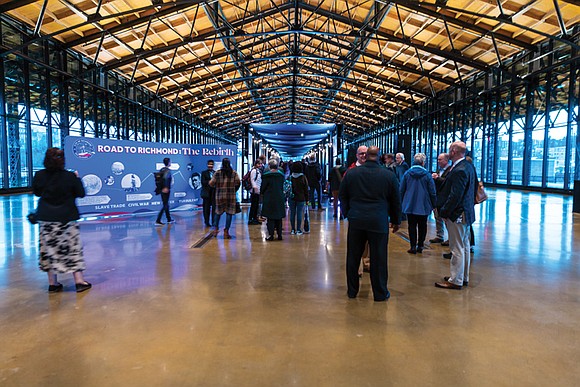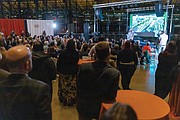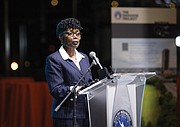City officials unveil ‘The Shockoe Project’
10-acre site to tell ‘a more complete story of Richmond’s history’
Free Press staff report | 2/29/2024, 6 p.m.
Mayor Levar M. Stoney, Delegate Delores L. McQuinn, members of the Richmond City Council and representatives from the Shockoe Institute yesterday unveiled “The Shockoe Project,” a 10-acre site in Shockoe Valley that they say is “dedicated to telling the full history of the Richmond slave trade and its national and global significance to the growth of our country.”
According to officials affiliated with the project, it will “share an accurate and inclusive narrative of the history of Shockoe — memorializing the traumatic experiences of enslaved Africans and Native Americans and honoring their struggles toward liberation.”
The 10 acres in Shockoe Valley will include:
• The Shockoe Institute at Main Street Station
• The site of Lumpkin’s Slave Jail
• The Mary Lumpkin Event Lawn
• Memorials to the African Burial Ground and to the hundreds of thousands of enslaved sold and traded through the area
• A commercial development along Broad Street
• A pedestrian bridge serving as a gateway to the site
• The National Slavery Museum
• And greenspace and walking trails.
“The Shockoe Project acknowledges and celebrates a national site of conscience, and today we celebrate the collaboration, teamwork, and effort of every single stakeholder who has been committed to this work over the years,” Mayor Stoney said. “We’re choosing to uplift Richmond’s full history and use its unique position to tell a national, and even global, story of how slavery was integrally connected to the complex evolution of this country’s history, economy, and culture.”
“We are deeply grateful to the Mellon Foundation for their unparalleled support of our mission to understand the enduring impact of the domestic slave trade on American life through evidence-based scholarship and innovative storytelling.” said Shockoe Institute President and CEO, Marland Buckner.
Our team is working diligently to build a nearly 12,000 square foot immersive educational facility within Main Street Station that will take visitors on an evidence-based, emotionally impactful journey that showcases the central role of the domestic slave trade in America’s rise to global economic dominance, and the ‘throughlines’ of that history to today,” said Mr. Buckner.
“Between now and our opening next year, we are working with a host of partners from London to Los Angeles to create and showcase content that, more than simply acknowledging our past, uses a deeper understanding of our past to confront today’s challenges to that uniquely American story: the story of the struggle to expand human freedom.”
“It warms my heart that after roughly twenty-five years, the Shockoe Project is moving from a dream to reality,” Delegate McQuinn said. “We have worked diligently over the past two decades to share the painful history of our ancestors.
Our work warranted a deep commitment as we plowed through crumbling pages of history books and documents; yet, the passage of time has not dulled our passion. I am extremely grateful that there is now a collective effort to finally memorialize our ancestors’ stories beyond the grave, and I am very appreciative for the statewide support this project has garnered. I am happy to say I look forward to witnessing its progress with a renewed spirit.”
“After dedicated efforts spanning over 25 years, we are thrilled to announce a significant milestone today,” said Richmond Councilwoman Cynthia I. Newbille, who represents the 7th District. “The collective hard work and commitment have led us to the realization of a long-awaited dream.
Our vision is to establish a site that not only sheds light on this terrible chapter in our nation’s history but also serves as a beacon of enlightenment, education, and remembrance. It is our sincere belief that this site will become a cornerstone for fostering a brighter and more promising future for all of humanity.”
Funding for the project, projected to be complete in 2037, includes $25 million from the City of Richmond, $13 million from the Commonwealth of Virginia, and $11 million from the Mellon Foundation.
To review the project’s master plan, please visit https://bit.ly/434qplp










